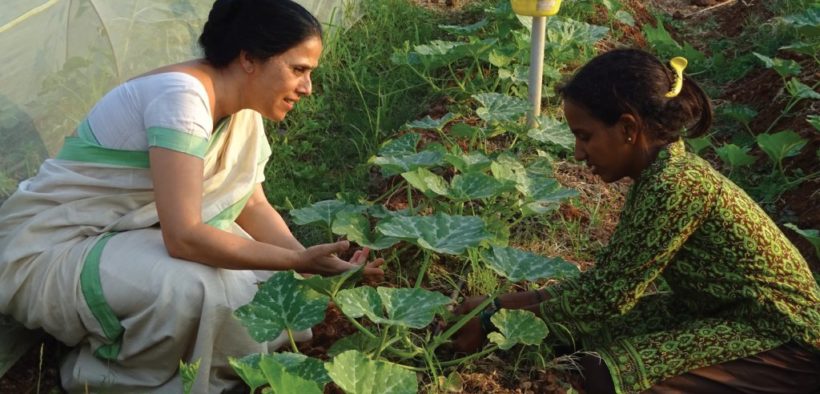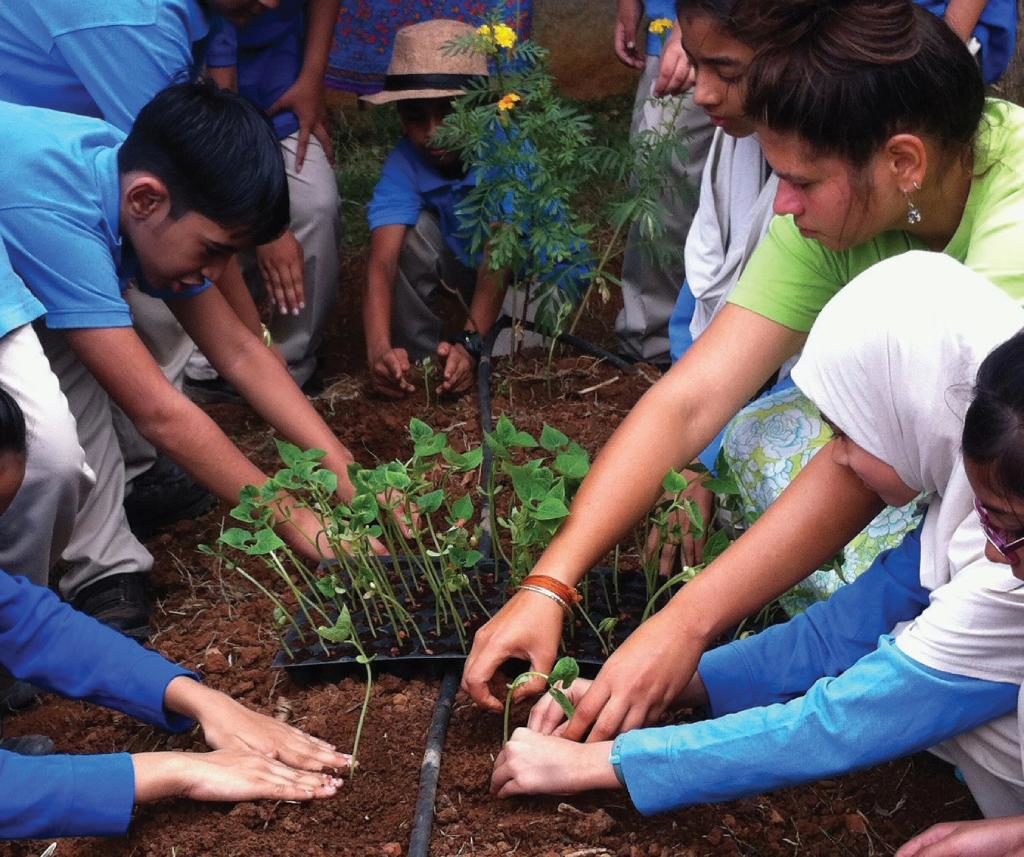Reseeding The Country

Sangita Sharma of Annadana sows the seeds of sustainable thinking by developing a regenerative, sustainable, organic agricultural model
Sangita Sharma gets passionate when the talk veers to the state of farmers in the country. “The saddest part is we have reduced our farmers to a begging bowl,” she says. “That today they, who are the producers, are steeped in debt and are committing suicide. Producing the nation’s food, 450 million tons of food, and yet we cry hunger? Sixty-five percent of our population are farmers and they have inherent skills to produce food. And you need an intelligent urban society to intervene and tell them what should be grown. And that’s why agriculture has failed miserably in our country and globally.”
When you hear Sharma speak, the passion for her work is unmistakable in her voice. She is the founder and chairperson of Annadana Soil and Seed Savers Network, a non-profit trust based in Bengaluru, Karnataka. It is the only active organic farm in Bengaluru that has two agro-ecological farm centers, an agricultural research station, a training facility, a field lab, and a classroom.
“I REALISED THAT EVERY FARMER, EVERY VILLAGE HAD THE SAME SET OF CHALLENGES. SEEDS WERE MISSING. AND THAT IS WHEN I STARTED TO UNDERSTAND THAT WE CAN TAKE CHARGE BY MULTIPLYING OUR OWN SEEDS.”
Sangita Sharma Annadana Soil and Seed Savers Network
India is primarily an agrarian country with around 60 percent of its population depending directly or indirectly upon agriculture and 46 percent of the total cultivated area of the country is net sown area. Agriculture contributes around 17 percent of the total GDP. And yet according to the 2018 Global Hunger Index, India stands at 103 out of the 119 qualifying countries. With more than 40 percent of children going hungry, India has the highest number of malnourished children in the world. When the need was dire, the Green Revolution assuaged scarcity of food but left in its wake degradation of soil, water resources, and seed diversity. The use of harmful chemicals left the food ecosystem devastated. Hunger, malnutrition, genetic erosion has increased greatly in the last several decades while the seed conservation ability has nosedived.
“The world population right now is 7.7 billion. The UN says there is enough food for over 11.5 billion. We won’t be running short of food any time soon,” says Sharma. “The primary cause of hunger is food distribution system and poverty. Production of more food will not solve it as those who need it the most cannot afford it.” The solution lies not in increasing the food productivity but in implementing an efficient public distribution system, in making our producers, our farmers seed and food independent, says Sharma.
Sustainable organic thinking
When Sharma relocated to India from Dubai in 2001, after quitting her cushy corporate job, her curiosity about how the food on her plate was being produced took her traveling all over the country. “I realized that every farmer, every village had the same set of challenges. Seeds were missing. And that is when I started to understand that we can take charge by multiplying our own seeds. That’s when I started to grow in my parents’ five-acre farm and I started to multiply my own vegetables and we went into Auroville,” says Sharma.
Annadana started operations in 2001 in Auroville, Puducherry, with technical support from Kokopelli, an international seed savers network based in France. Its mission was the promotion of production, multiplication, exchange, and conservation of organic seeds of traditional heirloom vegetable varieties, some cereals, and flowers. A solar-powered seed bank was established for the conservation of the traditional and locally adapted varieties replicable in the fields. In 2007, Annadana was registered as a non-profit trust and in 2010 it shifted its operations to Ishana Farms in Bengaluru. The 5-acre Ishana Farms soon became a certified agro-ecological knowledge farm. Every season, around 200 heritage vegetable varieties are conserved through 650 raised beds dedicated completely to seed conservation. Presently, continuous research and development of the best farming practices through an integrated sustainable and environment-safe approach is being conducted by a group of 12 farmers and 4 experts.

“Annadana’s 3 core areas have always been farmer welfare, where farmers are trained through research and by showcasing the best practices of sustainability of the world, and seed conservation are at the core of it being,” says Sharma. Since its inception, Annadana has been endorsing the traditional low-cost and innovative agricultural methods. They have been actively training farmers by imparting knowledge about conservation and multiplication of indigenous seed varieties and setting up seed exchange network so that farmers no longer depend on the costly patented hybrid and genetically modified (GM) seeds. “You can’t make policies without farmers because they know the crops and the seasons and we have decided that we know for them and that’s why we have failed in agriculture,” says Sharm. “We have failed as a nation to support our farming communities who are the producers of our food.” Annadana boasts more than 800 crops, including hundreds of fruits, millets, cereals, vegetables, and flowers. “Seeds are the most unassuming potent gift of life. The seed is food. Seed embodies the diversity,” says Sharma. “When we start to conserve these seeds, these are open-pollinated indigenous ones.”
My Right to Safe Food campaign
In 2009, Sharma launched the ‘My Right to Safe Food’ campaign to give informed food choices to consumers from all walks of life. Annadana played a pivotal role in bringing about a moratorium on GM foods in India. “Motivated by profits, the agrochemical corporations remain blind to suffering, deaths & disabled children due to pesticide poisoning,” says Sharma. “Artificially and genetically modified avatars of foods have fast gained swift in routes into India sneaking into our plates without you even knowing it. With the potential dangers of genetically engineered foods lurking, there is a grave assault in our food chain. We are breeding a very sick society with hospitals flooded. There is a sharp decline in trace minerals, vitamins, and other nutrients in many foods attributed to a steady deterioration in soil, air and water quality.”
My Right to Safe Food campaign raises awareness about the safe alternatives and solutions to safeguard your health. Around 15,000 visitors annually walk the farm trails at Annadana to understand the cultivation of organic food, while 5,000 students participate in the ‘Soil to Seed to Plate’ education programme every year. In a year, Annadana distributes 20,000 free packets of native seeds to empower the farmers throughout the country. They have also organized 3 tsunami rehabilitation programmes to safeguard 15,000 livelihoods. During the recent Kerala floods, they distributed more than 5 lakh seeds to farmers.
Sharma is fondly called beej Behen and has also earned the titles of Seed Guardian and Jewel of Karnataka. She has been felicitated with the Pan India Inspire award for environment conservation and organic biodiversity protection in 2019 and also Karnataka Women Achievers Award in 2018. Annadana aims to bring about a change in agricultural practices; to grow healthy food that nourishes the people as well as the land it grows in. “Our aspiration is to re-seed India by building sustainable communities founded on the bedrock of knowledge with progressive farmers and enterprising youth driving it,” asserts Sharma.
Back to A Nation of Change Makers
















